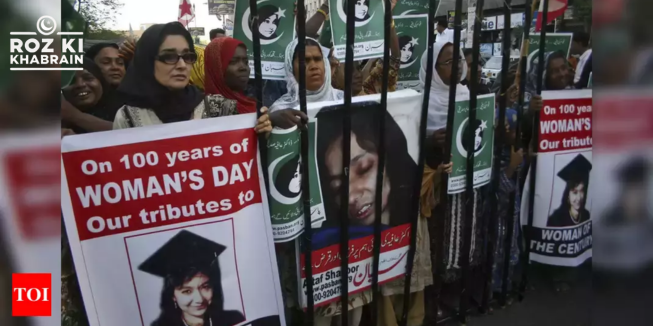Dr. Aafia Siddiqui, a Pakistani neuroscientist and former student at MIT and Brandeis University, has filed a lawsuit against US prison officials, accusing them of severe human rights abuses during her incarceration at the Federal Medical Center (FMC) Carswell in Fort Worth, Texas.
The 61-page complaint, submitted to the US District Court for the Northern District of Texas, alleges ongoing sexual assault, physical abuse, denial of medical care, and religious discrimination since her imprisonment in 2010.
According to the lawsuit, Siddiqui claims prison staff, including male guards, subjected her to repeated sexual assaults disguised as routine searches. She also alleges retaliation for reporting the abuse, citing an incident where she was doused with a burning acidic substance.
The lawsuit highlights religious discrimination, including denial of access to an Imam, religious items, and participation in Friday prayers. Siddiqui further claims male guards observed her during private moments, infringing on her religious and personal freedoms.
Her attorneys argue that the lack of adequate medical care violates her constitutional rights under the Eighth Amendment. Siddiqui has reportedly suffered from hearing loss, dental issues, and PTSD due to alleged torture in US custody.
This case brings renewed attention to systemic issues at FMC Carswell, a facility previously exposed for widespread abuse of female inmates. A 2022 investigation revealed numerous cases of sexual misconduct by staff, many of which were reportedly covered up.
Dr. Siddiqui’s legal team, including attorneys Naim Haroon Sakhia and Clive Stafford Smith, is seeking a jury trial and an independent investigation into the allegations. They are demanding immediate action to ensure Siddiqui’s safety, access to religious counsel, and proper medical care.
A History of Controversy
Dr. Siddiqui’s case has been shrouded in controversy since her arrest in 2008 in Afghanistan, where US authorities claimed she carried sodium cyanide and plans for attacks on American landmarks. During an interrogation, Siddiqui allegedly grabbed a rifle and attempted to shoot US agents. She was convicted in 2010 for attempted murder and sentenced to 86 years in prison, though no direct links to Al-Qaeda or terrorism were ever proven.
Her arrest followed her 2003 disappearance in Karachi, where she and her three children vanished shortly after the arrest of Khalid Sheikh Mohammed, a senior Al-Qaeda leader. Siddiqui was nicknamed “Lady Al-Qaeda” by US media, further fueling her controversial profile.
Calls for Justice
The lawsuit has sparked international attention, with human rights activists and Siddiqui’s supporters calling for accountability and justice. The Pakistani government has repeatedly called for her release, citing concerns over her treatment in US custody.
Attorney Naim Haroon Sakhia described Siddiqui’s suffering as “unimaginable” and a stark example of the failings within the US prison system. Co-counsel Maria Kari emphasized that the case aims to bring justice not just for Siddiqui but for other women facing similar abuses.
The US Bureau of Prisons has yet to respond to the allegations, but the lawsuit has intensified scrutiny of the treatment of detainees, particularly foreign nationals, in US facilities.
This legal battle could have far-reaching implications, reigniting debates over prison reform, human rights, and the ethical treatment of inmates in US custody.




